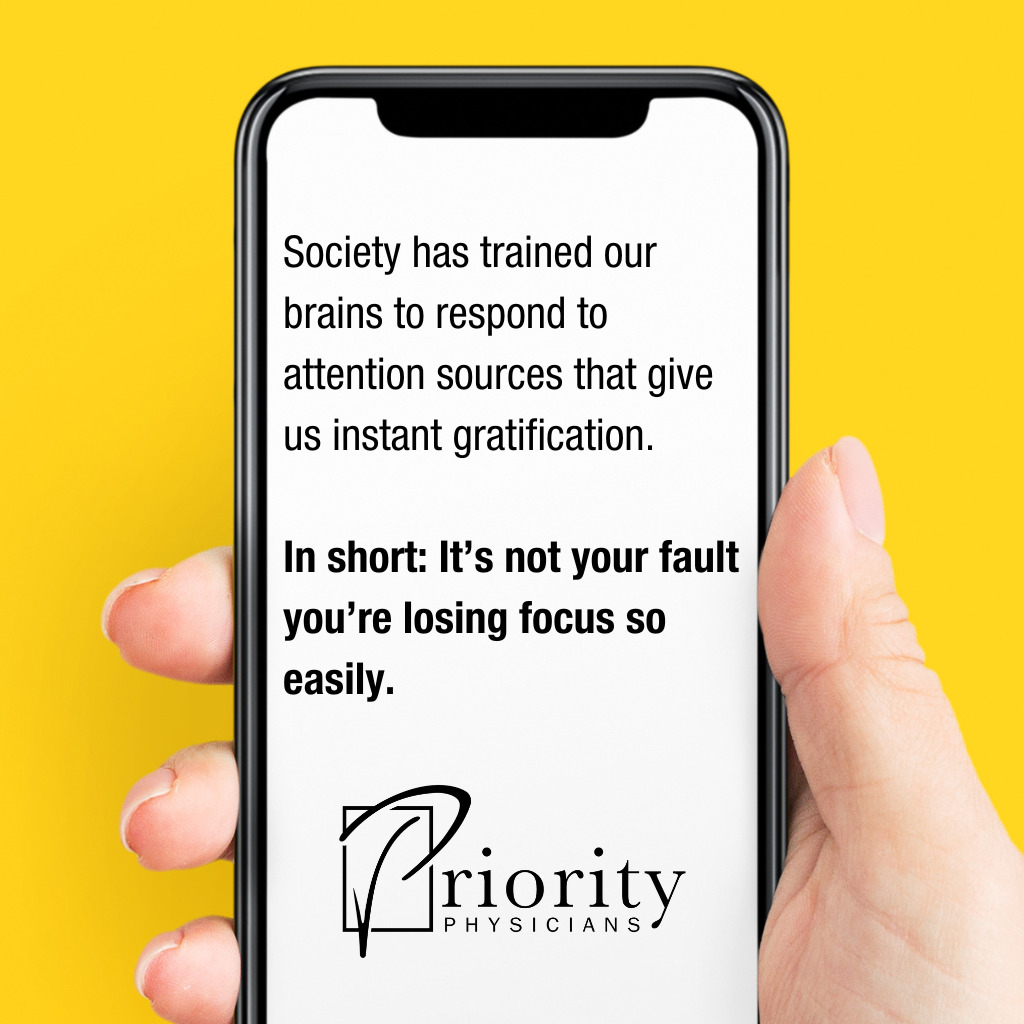Americans have a serious problem with focus.
This isn’t entirely surprising — humans are behaviorally inclined to develop routines, which don’t require a ton of attention. For example, when was the last time you really thought about your daily drive to work? Once you get behind the wheel, your brain likely goes into autopilot.
Certain parts of your job may also be repetitive and, ergo, mindless. Daily repetition leads us to master the art of using our brains without concentrating on what we’re doing. Without realizing it, we’ve literally trained our brains not to focus.
This isn’t even considering the distractions we place in our own lives. If you’re like most Americans, you always have a screen in your pocket, and there’s a screen in almost every room of your home. All those screens you voluntarily interact with are designed to grab and keep your attention.
When your brain constantly receives dopamine hits from social media updates and email notifications, it’s unsurprising that your mental reward system for maintaining focus gets hijacked.
Take reading, for example. Hundreds of years ago, humans read voraciously because it was one of the only forms of entertainment. Now, we skim a single headline and immediately decide to scroll to the next thing.
Society has trained our brains to respond to attention sources that give us instant gratification. In short: It’s not your fault you’re losing focus so easily.

Neuroplasticity and Losing Focus
Thankfully, there is a way to keep from losing focus permanently.
Neuroplasticity is the idea that your brain and central nervous system can change over time — and it’s fairly new to the medical field.
When I was in medical school (not too long ago), I was taught that the brain’s core patterns and functions don’t change outside of major medical incidents. For example, if you suffered a stroke, the impacted functions would never recover — or so we thought.
Now, we know that the brain can form new neural pathways in response to new routines, meaning we can literally retrain our brains to focus better.
Neuroplasticity in Practice
Let’s say a patient is in a coma in an intensive care unit. A doctor can usually estimate the amount of time it will take the patient to recover. That amount of time was once thought to be unmanipulable.
However, I personally know of researchers right here in Indianapolis who recently reduced the length of a coma patient’s ICU stay by a whopping 30% just by playing classical music.
Why does this work? The researchers believe introducing classical music to comatose patients stimulates the brain to form new neural connections.
If you’re reading this, you’re probably not in a coma. But you can still take advantage of neuroplasticity to stop losing focus. Consider the tips below.

4 Ways You Can Stop Losing Focus
1. Set Yourself Up for Success
Consider restricting or eliminating access to your screens. Removing these distracting stimuli from your environment can manually override the impulse to partake in instant gratification behaviors. Even limiting your social media time can make a big difference in your focus.
2. Find Joy in Longer Payoffs
Stop training your brain to expect instant gratification by conscientiously participating in “stretch” behaviors. Try challenging yourself to do activities that require some discipline. These swaps don’t have to be complicated; one simple way to practice this mental work is to finish a whole book.
3. Explore New Learning Opportunities
Your brain can’t learn new information if it can’t focus on new information for an extended period of time.
To overwrite this behavior, make a conscientious effort to engage in dialogue with others — especially those with opinions that differ from yours. When you meet somebody new, make it a point to ask relevant follow-up questions and listen to their interests.
4. Break Your Routine
When you force yourself out of autopilot and break your routines, you start building new neural patterns. It’s ironic — we establish routines to increase efficiency, but it turns out strengthening muscle memory is counter-productive in terms of mental dexterity.
So, rearrange your office. Stop using your GPS. Take a different route to work.
Breaking your routine might interfere with the optimization of how you go about your day, but if you want to stop losing focus as you complete your daily tasks, it’s one of the best things you can do.
Losing Focus: Final Thoughts
Losing focus at the hands of repetitive daily tasks is a common problem, but luckily, it’s one you have the power to reverse.
Intentionally making the actions you perform every day more difficult can help you regain control of your attention span — and the changes don’t have to be complicated. Try modifying existing patterns to improve your mental dexterity.

